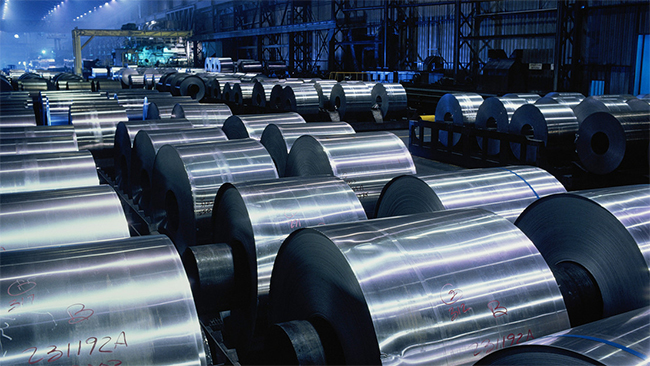The head of the White House imposed tariffs on steel and aluminum
by El Reportero‘s wire services
It was another Sunday of sporting jubilation in the US, where they are enjoying the Super Bowl, until President Donald Trump announced a new commercial attack, in this case global, while he was heading to the famous American football game.
The next day the president signed the executive orders on the imposition of 25 percent tariffs on all steel and aluminum imports in the North American country.
Added to the existing rates on metals, these tariffs threaten to shake the world economy. But which Latin American countries could be the most affected?
Various official sources, referred to by international media, indicate that Canada will be the hardest hit because it is the main exporter of these products. However, right behind are Brazil and Mexico, in addition to Asian and European nations.
Brazil is the second largest supplier to the US, accounting for 15 percent of the total volume of its steel imports. Therefore, steelmakers in the Amazonian giant are already beginning to worry.
“In the first government there were measures against steel and aluminum, based on national defense,” Welber Barral, former Brazilian Foreign Trade Secretary, recalled to O Globo. “With this additional 25 percent tariff, it will be even more complicated to export to the US,” he added.
Indeed, in his first term (2017-2021) Trump was slow to take this type of tariff action, but he still opted for a 25 percent tariff on steel and, on the contrary, a 10 percent tariff on aluminum.
“It is surprising because steel is a fundamental raw material for the American industry. The Americans will be the ones to pay the price, since it will increase the internal production cost and raise inflation,” said the president of the Brazilian Foreign Trade Association, José Augusto de Castro.
In response, rumors spread that Luiz Inácio Lula da Silva’s administration was planning to impose tariffs on American technology companies, labeled as a “digital tax,” according to a report by the Folha de S.Paulo newspaper, citing an anonymous Brazilian authority. However, that claim was denied by the Minister of Economy, Fernando Haddad.
The answer, for now, is prudence. “The Brazilian government made the sensible decision to express itself only in a timely manner based on concrete decisions and not on announcements that could be misinterpreted or revised. Let’s wait for the president’s guidance,” Haddad wrote in X.
The Mexican case
Although it was recently surpassed by Brazil, despite the geographical proximity, Mexico is also a key market for these imports. It represents 12 percent of the total.
82 percent of its exports of steel, aluminum and other manufactures are destined for the United States, said the director of Economic Analysis of the BASE Financial Group, Gabriela Siller Pagaza.
In addition, shipments of Mexican steel, aluminum and manufactured goods to the U.S. accounted for about 2.1 percent of Mexico’s total exports last year, Siller said.
The free trade agreement signed by the three North American nations (USMCA) has strengthened trade integration among them, particularly in the steel industry, to the point that they have substantially increased steel production.
However, Trump constantly alleges “disloyalty” on the part of his main trading partners and, with this new action, he also seeks to boost one of the sectors that most supported him to return to the White House.
“A cool head on this,” Mexican President Claudia Sheinbaum asked on Monday. “We will wait to see if [Trump] announces something today and from there we will make our decisions,” she added at her morning press conference.
A journalist asked Sheinbaum if there will be a negotiation, but she avoided specifying on the matter. During the administration of her predecessor, Andrés Manuel López Obrador, Mexico managed to obtain tax-free quotas, just like Canada and Brazil.
Other repercussions
Although Argentina is not, by any means, a trading partner for the US at the level of its neighbors, the Trump Administration’s measure could strongly hit the giants Tenaris and Aluar, which export part of their production to the North American country.
In the case of Aluar, the only primary aluminum producing company in Argentina, almost half of its production (40 percent) goes to the US.
“Argentina should assert the fact that we have a chronic trade deficit with the US,” urged the former president of the Central Bank of the Republic, Martín Redrado. “According to that logic, Argentina should be exempt from the measure,” he added.
Now Argentine businessmen hope that the Foreign Ministry will reach a new pact with Trump and that the Javier Milei administration will use the good relationship it maintains with him to reach another exception, as occurred during the government of Mauricio Macri (2015-2019).
And when the magnate imposed tariffs of 25 percent on steel and 10 percent on aluminum, it also affected nations with which it has signed a free trade agreement, such as Colombia. Data from the National Administrative Department of Statistics (DANE), cited by the local press, show the effects.
Colombian steel exports to the US accounted for just 0.52 percent in 2018 and have dropped to a meager 0.3 percent by 2024. As for aluminum, sales have declined by 7 percent.
– With reports from RT.



